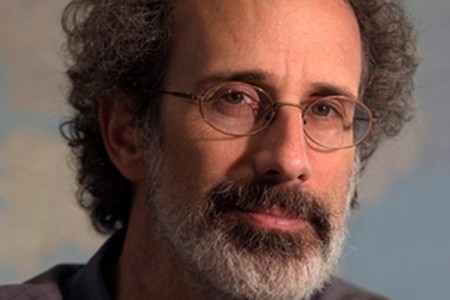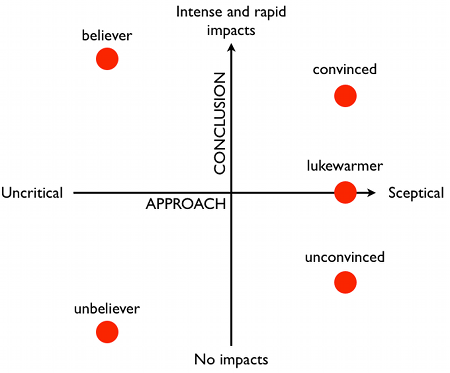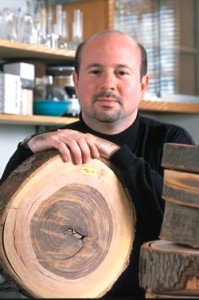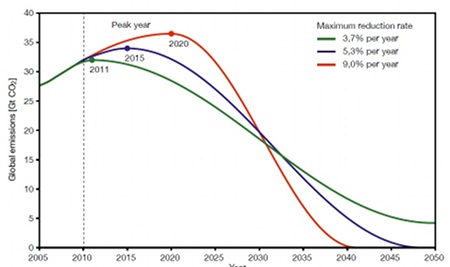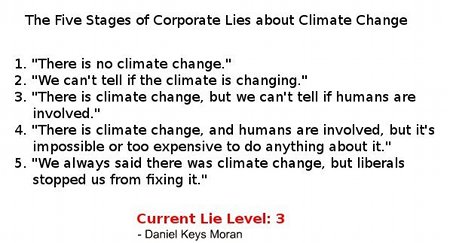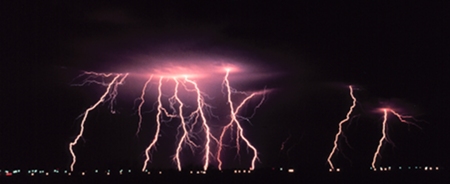
Credit: NOAA Photo Library, NOAA Central Library; OAR/ERL/National Severe Storms Laboratory (NSSL)
After the season 2 finale of Downton Abbey on PBS last week, there was a “making of” featurette that touched on the 1918 flu outbreak that was part of the plot. They mentioned a fact I’d heard before but had forgotten: In severe flu pandemics, a disproportionate number of those who die are otherwise-healthy young adults. They’re prone to a particular kind of immune system response known as a cytokine storm. From Wikipedia:
When the immune system is fighting pathogens, cytokines signal immune cells such as T-cells and macrophages to travel to the site of infection. In addition, cytokines activate those cells, stimulating them to produce more cytokines. Normally, this feedback loop is kept in check by the body. However, in some instances, the reaction becomes uncontrolled, and too many immune cells are activated in a single place. The precise reason for this is not entirely understood but may be caused by an exaggerated response when the immune system encounters a new and highly pathogenic invader.
A healthy immune system is a good thing, normally, but the positive feedback loop of a cytokine storm can lead to fever, fatigue, nausea, and death. In the 1918 pandemic, between 50 and 100 million people died, making it one of the deadliest disasters in history.
While obsessing this week over the events of the Heartland leak, it occurred to me that in a way, we’re going through the cultural equivalent of a cytokine storm. For those of us who accept the mainstream scientific views expressed in IPCC reports, climate change is an existential treat. For Heartland to be working to forestall action on climate change makes them, in the eyes of climate activists, the equivalent of a “new and highly pathogenic invader” that provokes an exaggerated response.
Ignore for the moment the fact that the released documents show Heartland to actually be a pretty small, and in some ways unimpressive, cabal of supervillains. For Peter Gleick and his more ardent supporters, the stakes are so high that when combatting Heartland virtually any ethical breach (including lying) is permissible, even heroic. Like Barry Goldwater addressing the 1964 Republican convention, their view could be summarized as: Extremism in the defense of climate is no vice; moderation in the pursuit of consensus is no virtue.
I first thought of the cytokine storm analogy while reading this post by DeMelle and Littlemore at DeSmogBlog: Evaluation shows “Faked” Heartland Climate Strategy Memo is Authentic. Having studied the contents of the strategy memo, and the arguments for and against its authenticity, my reaction to DeMelle and Littlemore’s argument was immediate and unequivocal: they’re wrong, and obviously so. They must either be actively lying or passively bullshitting (that is, willfully disregarding the truth to assert a position they favor, without bothering about facts).
The argument about the strategy memo’s authenticity began last week, before Gleick’s confession. Heartland’s first public response to the leak, on February 15, denounced the strategy memo as “fake.” McArdle argued against the memo’s authenticity in her February 16 column, Leaked Docs From Heartland Institute Cause a Stir – but Is One a Fake? At DeSmogBlog, Littlemore wrote a piece the same day asserting that Heartland was trying to change the subject from their own wrongdoing by focusing on the forged memo, and saying the onus was on them to prove it was a fake.
McArdle followed with more criticism the next day: Heartland Memo Looking Faker by the Minute. And really, she was right. The deeper one dug into the document, the harder it became to believe it was genuine.
All of which made DeMelle and Littlemore’s February 22 post a real eye-opener for me. Whether they were knowingly lying or were merely burrowed so deeply into their ideological bunker that they no longer recognized the truth, they were fatally compromising their credibility in the eyes of anyone other than their most committed followers. As McArdle wrote of Gleick in her February 21 column (Peter Gleick Confesses to Obtaining Heartland Documents Under False Pretenses):
After you have convinced people that you fervently believe your cause to be more important than telling the truth, you’ve lost the power to convince them of anything else.
It was true in the case of Gleick, and it’s true in the case of DeSmogBlog: The overreaction to their ideological opponents has had the effect of destroying their credibility. It’s the cytokine storm. Faced with the threat of the Heartland pathogen, the DeSmogBlog bloggers’ impassioned immune response has carried them beyond the point where they can effectively win the hearts and minds that their larger mission requires.
Greg Laden, an anthropologist blogger at Science Blogs, quickly endorsed DeMelle and Littlemore’s defense of the strategy memo’s authenticity. He linked to it from this item: “Faked” Heartland Institute Doc is Authentic, writing:
This memo is so embarrassing that Heartland has been insisting that it is fake, but a new evaluation of the document demonstrates that it is not.
It doesn’t demonstrate that, and by endorsing that view Laden undercuts his own credibility. He’s simply accepting DeMelle and Littlemore’s characterization at face value, because they are on the same side in the fight against Heartland, and they share the belief that a vigorous immune response requires them to attack the Heartland infection uncritically.
Commenters questioned Laden’s position. I enjoyed this comment, by jumm33:
ROFLCOPTERS!!!
http://www.dailykos.com…
http://www.democraticunderground.com…
and now this.
(Knarlyknight, in particular, will appreciate the second link.)
I weighed in as follows:
So, are you asserting that Heartland actually did prepare the strategy memo for internal distribution, and distributed it? That seems extraordinarily unlikely to me.
I think this might be a case where the willingness to engage in motivated reasoning and confirmation bias to defend an untenable position (“the strategy memo is legitimate”) ultimately will do damage to the reputations of those who engage in it. It would be a tragic irony if this became another incident like Climategate in terms of actually lessening public support for action to address climate change, but I see a real risk that that’s where this will end up if people on the science side indulge in defenses of Gleick’s actions that are perceived as irrational by the general public. And that’s how a defense of the strategy memo as legitimate is going to be perceived, I suspect.
Another user made a comment about people “trolling” (without singling me out, but I assumed he was including me). I wrote this in reply:
I’m not trolling. I’m a sincere advocate for taking climate science seriously. I believe, though, that taking it seriously includes thinking about how we’re going to deal with the sizable chunk of people who are politically conservative and get much of their information from dubious sources like Fox News. If we can’t peel off a significant number of those people and get them to recognize the truth about climate change, we don’t have a chance of implementing the kind of collective strategy climate change requires any time soon.
We’re not going to get those people with dubious arguments like this. And dubious it is: If we can’t divorce ourselves from what we want to believe long enough to appreciate the evidence in the strategy memo that argues for it being a fake, then in my view we are falling short of the requirements of honest skepticism.
Yes, the denialists (the worst of them, at least) are legitimately villainous. It’s understandable that the combination of fear and anger that their actions provoke would push anyone toward a polarized position and a desire to push back against their lies with assertions like the one being linked to here.
It’s an understandable temptation. But the temptation must be resisted. If Peter Gleick’s mistakes teach anything, it is that the consequences of succumbing to an ends-justifies-the-means erosion of principles can be severe. Yes, we need to confront the fallacies, mistaken beliefs, and outright falsehoods coming from the denialist side. We are in a battle for hearts and minds. But if we get so caught up in the battle that we are willing to treat the flimsy arguments offered by DeMille and Littlemore as compelling, we will lose the war. The vast majority of currently-undecided third parties are not going to look at the evidence and conclude that the strategy memo is authentic. They are going to conclude that we are irrationally committed to our position, and that the denialists are probably right when they say that the scientific consensus is a sham produced by people who are being similarly irrational.
They will be wrong to conclude that. But by the time the climate has worsened enough for them to realize it we will have lost valuable time to address the problem.
I see the response to the denialist’s dishonesty as being analogous to a cytokine storm. We’re like an immune system reacting to a pathogen. But in the case of Peter Gleick’s actions, and of those who now defend him to the extent of calling his actions heroic and arguing that the faked strategy memo is authentic, our reaction threatens to do more harm to the patient than the pathogen ever could.
I recommend what Megan McArdle has written about the strategy memo. I don’t agree with everything she’s written about it, but she’s got a good take on the degree to which the defense of Gleick’s actions by climate activists threatens to undermine our position in the larger debate.
I don’t know if Gleick forged the strategy memo himself. But I think it’s clear that someone forged it, and that whoever committed the forgery had access to the legitimate documents. I remain intrigued by the idea that this was a false flag operation, in which someone who had access to Heartland’s internal documents leaked the fake memo to Gleick hoping he would release it, after which he could be denounced and neutralized as an opponent. I don’t think that scenario is nearly as far-fetched as McArdle seems to think. But I don’t actually know. And neither do most of us, at this point.
The only people who know for sure whether Gleick is telling the truth about the fake strategy document are Gleick, and, if Gleick is telling the truth, the person or persons who forged it and sent it to him. If this ends up in court, and if Gleick has evidence to corroborate his account of the timeline, this could get really interesting, since that would mean he could mount a pretty convincing case that he was, in fact, set up by someone with access to internal Heartland documents.
I don’t know what the chances of that are. But I know that being skeptical means I need to keep an open mind about the competing explanation favored by the denialists: That Gleick is just lying, and that he forged the strategy memo himself as a way to try to make the document leak “sexier”.
MikeB made a substantive response, but I took exception to this part:
Stop pearl clutching – at best it looks weak, and at worst it looks like concern trolling.
This prompted me to respond as follows:
I’m not sure what pearl clutching or concern trolling are, but if I’m engaging in them I apologize. From where I sit, I’m just being as honest as I can about how I see the issue.
I haven’t “made my mind up” about the strategy memo, except that after considering it carefully, I do believe McArdle’s assertions about its implausibility are compelling. The specifics of what it says and the way it says it don’t pass the smell test. It simply isn’t credible as an actual internal Heartland document intending to lay out their actual strategy for some sort of limited internal distribution. There are plenty of good analyses of this question out there already, so I don’t think I need to go into them. If you disagree, that’s fine, and it’s your prerogative, obviously. But if you haven’t examined the question in detail, I encourage you to take another look, beginning with McArdle’s arguments from last week.
I’m not simply crediting Heartland’s claims that it is “fake”. But their willingness to make that claim, early and often, does factor into my thinking in this way: If the document were legitimate, and was actually prepared for its described purpose, then it would presumably have been distributed to multiple people within Heartland. That raises the stakes for Heartland to denounce it as they have. If there are other copies of it, perhaps other versions of it, floating around within Heartland it becomes a much greater risk for them to make the statements they have, since at any time one of those copies could come to light.
The people running Heartland disagree with me, and are willing to baldly assert things that are untrue; I’ve seen them do it. But they’re not stupid. Taken together with the content and style problems of the document itself, their willingness to put themselves out there calling it a fake and making it the centerpiece of their response to the leak is enough for me to conclude that yeah, they’re probably telling the truth, at least in a very narrowly construed sense, when they say that.
As I’ve said repeatedly, I think the question is still very much open as to who it was who forged it, and for what purpose, so in that sense my mind isn’t made up about the document at all. But I do believe that the position being endorsed by Greg Laden in the item above is dubious. So I guess you’re right about my mind being made up on that point. I’d be interested in hearing counterarguments, but I don’t think those made by DeMille and Littlemore in the linked-to item are compelling. I think their confirmation bias is showing.
I think I had convinced myself that we were making progress toward some kind of collective shared insight. (Heh. On the Internet.) The next comment, by user elpsi, brought me back to reality:
John Callender
http://scienceblogs.com/gregladen…
See Douche, that is what actual skepticism looks like
Sigh. I realize it’s just one person, and random drive-by nastiness is a fact of life online. But it bugged me, in part because I’d thought (naively) that I was among the like-minded, on a blog sympathetic to “my” side.
The item he (or she, though I think the balance of evidence strongly favors he) linked to was one I’d already read, in which Laden reproduced Shawn Otto’s experiment with content analysis as a means of identifying the strategy memo’s author (which itself was inspired by Anthony Watts’ post on WUWT). As I wrote in a previous post, I found the “methodology” employed by both Otto and Laden to be fairly ridiculous. The results were kind of funny, but not anything to be taken seriously. I assumed that was the spirit in which Otto made his post, but with Laden I wasn’t sure; coming off his credulous endorsement of DeMelle and Littlemore, it seemed like he may have thought the analysis was actually significant.
The cytokine storms of the climate debate operate at multiple levels. I just finished reading James Lovelock’s The Revenge of Gaia; Lovelock would argue that the planet itself is a metaphorical superorganism, and that the warming feedbacks we’ve triggered are the equivalent of a planetary cytokine response. In more human-centered terms, the warnings of scientists like Mann and Hansen are frightening to people like me, producing a reaction in which we organize and pressure government to act quickly, without waiting for a broader societal consensus. On the other side, pressure for carbon pricing is viewed as a profit-threatening pathogen by the fossil fuel industry, and the big-government programs that would implement those policies as freedom-killing pathogens by free-market advocates. So they activate their political T-cells and macrophages (e.g., Heartland, and legions of snarky online deniers) and rush to the site of infection.
Gleick saw the Heartland Institute as a deadly infection, and ramped up his immune response to a breathtaking degree. Those who defend his actions by asserting ridiculous things are doing the same: responding to the threat with a fervor that I fear will lengthen the time until we can act on the climate problem with a common sense of purpose.
The only way we will successfully combat climate change is if we act in unison. Not just as one ideological camp, or as one nation; in Lovelock’s view, not even as one species. We need to unite as one planet, or at least as one planet-wide superorganism, with a willingness to balance human needs against the needs of the larger biome’s climate-regulation function. Which is… a daunting requirement.
We’re not going to get there like this. We’re not going to get there as long as those concerned about the problem are willing to sacrifice their credibility in the name of fighting the other “side.”
Medical researchers are working on ways to counter cytokine storms. From an article by Shaoni Bhattacharya in New Scientist, New flu drug calms the ‘storm’:
To dampen down the immune reaction, the researchers targeted a specific molecule present in the inflammation response called OX40.
Normally, when the lungs are under attack from a virus, the body’s T-cells are activated. These migrate to the lungs to attack the microbes but they also initiate a second immune system attack called a “cytokine storm”. This surge of chemicals causes inflammation and when severe can seriously harm or even kill the patient.
“After one or two days, the T-cells increase production of OX40,” explains Hussell. “This molecule gives the T-cell a ‘survival signal’ – which makes them hang around in the lungs for a lot longer.” But new cells are arriving all the time, says Ian Humphreys, who led the study, so this prolonged presence is not needed, and exacerbates the cytokine storm.
The new drug, an OX40 fusion protein called OX40:Ig, works by binding to the OX40 receptor and blocking activated T-cells. OX40:Ig, supplied by the company Xenova Research, stopped the symptoms of flu in mice.
We need to dampen our over-the-top immune response. We need to be less strident, less virulent, in response to the other side, so we don’t close off the conversations that need to take place in order for us to build consensus and take action.
I’m saying “we” and “our”, but I’m mostly talking about me. I’ve lost my cool in the comments here a few times lately, saying some nasty things to a certain global warming skeptic that I would never have said to his – or anyone’s – face. It wasn’t Gleickian in degree, but my willingness to treat shcb as a second-class citizen on a blog where he’s probably contributed more content than I have was certainly Gleickian in tone.
I’ve spent time over the past few weeks on web sites I wouldn’t normally visit, places like climateaudit.org and Judith Curry’s blog and even WattsUpWithThat. There are views and attitudes being expressed there that are as misguided as anything I’m criticizing here. But there are also a lot of thoughtful discussions by people who are clearly quite rational and interested in getting to the bottom of things.
Here’s a post I made at Steve McIntyre’s Climate Audit blog:
I’m very interested in the question of whether Gleick forged the strategy memo, vs. his having received it anonymously via mail prior to the phishing attempt (as he said – or at least strongly implied – in his HuffPo confession). I realize that there are lots of fingerprints in the memo itself pointing to Gleick as the author. And I realize that there are enough similarities between the fake strategy memo and the legitimate documents to make it implausible that the strategy memo could have been forged without the forger having access to those documents.
Basically, I’m looking to list the evidence for and against the “honeypot” scenario, in which someone other than Gleick who had access to the internal Heartland documents forged the memo, intentionally inserting real information, fake information, and clues that would tend to implicate Gleick as the forger, then mailed it to Gleick hoping he’d publicize it, after which it could be used to discredit him.
I’m not trying to suggest that the honeypot scenario is more or less likely than the more straightforward explanation, that Gleick forged the document himself in an attempt to “sex up” the document release. But I’m interested in the arguments for and against both explanations.
I’ve got some commentary on my blog at lies.com that explains more of where I’m coming from. Disclosure: Anyone going there will quickly discover that I have a history as a warmist liberal who complains about people ignoring the “scientific consensus”. For which I actually want to express a certain amount (but only a certain amount) of sincere chagrin. This whole incident, and some of the actions by my warmist fellow travelers (including, but not limited to, Peter Gleick) have created what might be termed “a teachable moment”.
Anyway, I’m looking to be taught, and I’m impressed by the quality of analysis I’ve been finding in threads like this one on a bunch of blogs I never paid much attention to before. So feel free to cut me a new orifice if you feel the need. But if you’d also be willing to comment on the question I ask above, along with your reasons for thinking the way you do, I’d appreciate it. Thanks.
I was bracing myself for a hostile reaction, but it didn’t come. Instead I just got people politely offering me their views. Elsewhere in the same thread I came across a comment by Richard Betts that included this:
But I guess maybe the whole thing is just symptomatic of how this so-called “Climate Wars” business is getting completely out of hand. The militants on both sides need to rein it in before someone actually gets hurt (I mean for real, not just their reputation).
We now need Radical Moderates to step forward and distance themselves from the extremists (at both ends). Let’s talk it all through like grownups instead of banging on about alarmists, deniers and conspiracy theories. It’s all very childish.
In response, Steve McIntyre wrote:
I agree that the situation has gotten out of hand.
[snip]
If I were the CAGW sales manager, I would view one of my key missions as focused marketing to the precise sort of people that make up the audience at Climate Audit, Lucia’s, Jeff Id and to a portion of Watts Up: highly educated professionals, including scientists from other fields, who are interested in the climate debate, who are technically competent and who haven’t reached an opinion on whether climate is a big, medium or small problem (including me.)
The audience has to be treated more like investors than high school students i.e. if you’re pitching to investors and they don’t invest, you can’t “fail” them or tell them that they’re stupid or tools of the fossil fuel industry; you have to think about why your pitch failed and what you can do better, and leave on good terms with the investor and maybe you’ll have another chance later on. It’s madness to condemn this audience as “deniers” or “ground troops” of the fossil fuel industry – madness both on the part of the activists who do so and madness on the part of the broader climate “community” that tolerates and even honors such conduct from its activist wing.
Also too many of the self-appointed sales people for CAGW are too wrapped up in their own self-importance and are unlikable to an extended audience. Indeed, if I were CAGW sales manager, I could hardly imagine a sales force more unlikely to succeed. This is quite aside from whether the message is right or wrong. If it’s important to actually persuade someone on the fence that CAGW is an imminent danger, then it’s important to talk to people on the fence or even in opposition (to get them on the fence.) It’s also probably important to retire some of the self-appointed sales people – thank for their service politely but get spokesmen who can build trust with a wider community.
I think Betts and McIntyre have a point.
As I was sitting down to write this, I saw a new post by Michael Tobis on his Planet 3.0 blog. Tobis has been one of my favorite voices commenting on this whole affair from the perspective of “my” side. I can’t really summarize his post adequately; you really have to read the whole thing to get the feel of his confused, exasperated, but oddly liberated tone: What a shiny damn penny! Here’s a taste, at least:
What a couple of weeks! Amazing stuff everywhere!
I have rethought it and I concede that the Wattsians and McArdle are right. The disputed memo is not plausibly from Bast or directly from Heartland. Nobody who speaks English would plausibly use “anti-climate” to describe themselves under any circumstances.
But Peter Gleick. Who? You’re joking, right?
I have thought some more about it and this is what I think. When he was first accused, and as I and many others thought, wildly and implausibly accused, I expected a strong performance from Peter Gleick in the mode of Santer or Mann. Really better than Santer or Mann, who didn’t expect it and didn’t have the personality to easliy endure it. It didn’t cross my mind for a second that Peter was guilty.
But he is guilty, so now the question was, was it worth it? My first response was, along with everybody else’s, no, no way was it worth it, but surely Peter didn’t compose the Disputed Memo.
The publication of the emails by Heartland on fakegate.com have changed my mind. Peter made no attempt to be anonymous. As soon as they realized they were being spoofed, it was obvious. They looked ridiculous and got a lot of eyes trained on them. Then totally unexpectedly, Peter confessed!
Actually, he had to yank their chains pretty hard before they even noticed. What a transparent hack! Nitwits!
I don’t necessarily agree with the conclusion Tobis arrives at; read it yourself and see what you think. But I’m impressed at the mere fact of his movement. Speaking from experience, changing one’s views is hard. If Gleick’s self-destructive cytokine storm makes it so people like Tobis (and me) are forced into an honest re-evaluation of our deep-rooted beliefs, maybe there will be some good that comes out of this after all.
